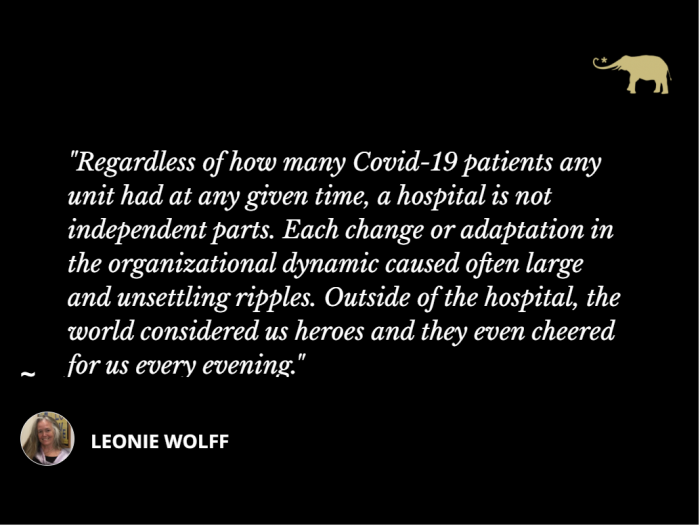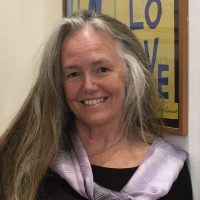~
I have been a registered nurse for over 30 years.
I work in a hospital birth center, and this work, while being a passion, has never been the center of my life. The other work of my heart and spirit, family, and many different communities of friends have been.
Back in March 2020, life closed down, and family, friends, activities, and general nonvirtual interactions receded. Suddenly, other than close family and colleagues in the hospital became my central and often only in-person human interaction. This was true for all of us working together. As our outside lives shrunk, the relevance of each other grew.
We were not home learning to bake bread; we were driving through eerily empty streets to walk into a hospital environment that was completely changed. At the beginning of the pandemic, we came together, behind the masks we bonded while responding to the common enemy: COVID-19. Regardless of how many Covid-19 patients any unit had at any given time, a hospital is not independent parts. Each change or adaptation in the organizational dynamic caused often large and unsettling ripples. Outside of the hospital, the world considered us heroes and they even cheered for us every evening.
The campus of the hospital was filled with signs of support. Gifts of food and homemade masks poured in.
Fast forward to today, I am still in the hospital. Barely. Many of my peers are not. These days, we are more likely to encounter protests outside of the hospital. I do not want to dredge up all that has happened, or what we have all experienced. I simply want to reflect on where we are today. For many years, I offered retreats for burned-out health professionals. I know what that looks, sounds, and feels like from sitting in those circles and from being burned out myself. Now the tone is different and worse. We are exhausted, profoundly disheartened, and angry.
The allopathic health care system in the United States has been in trouble for a long time. We know this and many of us remained to “be the change” from within. And now, it is falling apart and it is worse than any other time in my career.
While breaking apart could lead to building a better system, this bureaucracy is staffed, especially at the bedside, by human beings with hearts and spirits. The health care breaking apart takes people with it. And believe me, this is not a good time to have your appendix burst, become septic, and need emergency surgery.
How do we, the walking wounded, begin to renew our passion? How do we begin to shift reactionary stress into a conscious response? By recognizing that we show up every day in our scrubs and masks, weighted with grief. Grief is most often attached to death, yet I invite you to consider grief and loss in a broader sense. Be alive and you will grieve.
I create and offer retreats for people facing grief and loss. Through this and my own experience, I have come to recognize three pathways of grief:
>> The loss of someone or something precious.
>> The wounds of a lifetime.
>> The grief of unfinished or unrealized dreams.
In other words, asking ourselves these questions: what happened to us? What was done to us? What didn’t happen?
Everyone has their own unique experience and expression of grief, so your story is yours to tell. Yet, I invite you to consider that at the roots of your despair, your exhaustion, your anger, is one or all of these pathways of grief. Who or what have you lost that is precious to you? How do the experiences of the pandemic touch and wake up your life of wounds? What dear vision you held for your life has receded from view? And know this: any grief touches and stirs up all grief. What you feel now is not just about the pandemic.
We are facing the reawakened grief of a lifetime. A loss, I believe, many of us in the health care share is the family at work that came together when Covid first reared its ugly head. And it is now devolving into dysfunction. We are having trouble being kind to each other these days, a symptom of how as individuals, we are not doing well.
The first days and weeks of acute grief and loss can be agonizing. Conventional advice gives us a year to grieve. Yet the overwhelming experience is that the second year is differently harder. The relentlessness wears us down, we get quieter about our losses, and magical thinking fades when we realize that what was lost will not return. This is an experience we share in this second year of the pandemic.
As it all feels overwhelming, what is any first step? From my experience and as I sat in a circle with people who are grieving, I developed my own stages of grief and loss. A beginning place is what I call: find a Horse. It came from the days after the death of my husband, Joe, when I would go out to my horse, Red Boy, wrap my arms around his neck, lean in, and wail.
He loved me and my presence and would stand there as long as I needed him to. He was strong, warm, breathing. And most importantly, no matter what I said or how much I cried, he did not say a word. He certainly did not try to fix me. He simply loved me and was steadfastly present.
To my beloved colleagues, my gentle invitation is to recognize your grief. Recognition is a powerful first step toward integration, toward walking through. Then:
Find a horse.
It can be an actual horse or it can be a warm, present, and breathing being. A caring other. It can be a two or four-legged creature. And while in the moment it can be a helpful release of pressure, the venting we do every day with each other is something different entirely.
To others who are reading this: if you love someone who is a health care provider, if you have watched them change during the pandemic, if you wonder, “Where did they go? What can I do?”
My invitation—my urging to you is this:
Be a horse.
Be warm, present, and breathe. Offer generous listening with your ear tuned to your heart. And like a horse, remain silent even within their silence. If you love a broken person in front of you, this is a profound gift.
Maya Angelou said: “There is no greater agony than bearing an untold story inside you.”
After many years sitting in circles with people on a difficult path, I know this: finding a horse and being a horse can be beautifully, profoundly enough.












Read 18 comments and reply